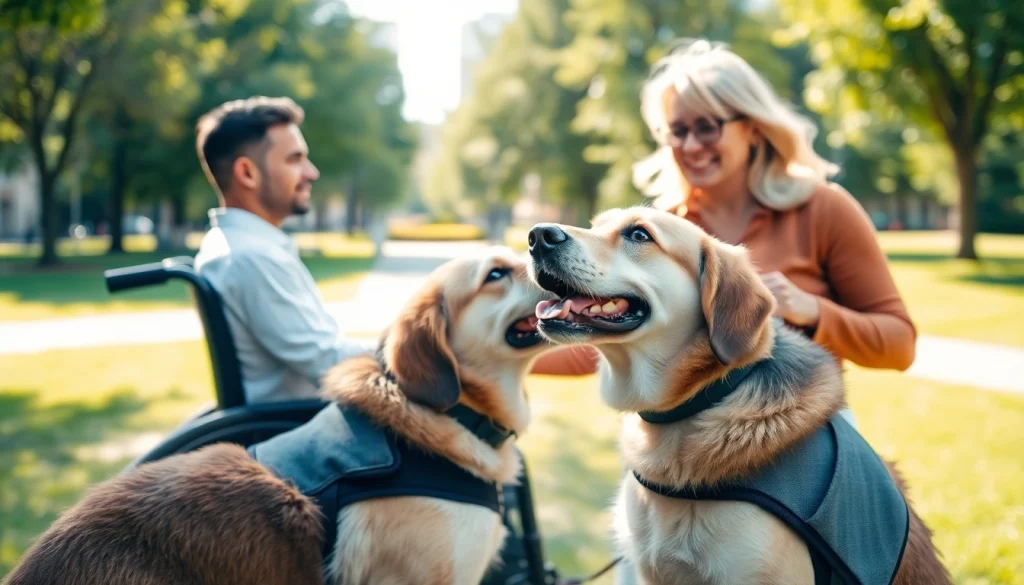
Understanding Service Dogs
What is a Service Dog?
A service dog is a specially trained canine that assists individuals with disabilities in performing specific tasks. These dogs are more than just pets; they are highly skilled companions that help their handlers navigate daily life by providing essential support. Service dogs are trained to carry out a variety of functions, tailored to the specific needs of their handlers. This may include helping individuals with mobility challenges, alerting those with hearing impairments, and offering companionship to those with mental health conditions.
Types of Service Dogs Available
Service dogs can be classified into various categories based on the type of disabilities they assist. Below are some common types:
- Guide Dogs: Specifically trained for individuals with visual impairments, guide dogs help navigate obstacles and improve their handler’s safety and independence.
- Hearing Dogs: These dogs assist people who are deaf or hard of hearing by alerting them to important sounds, such as alarms or someone knocking on the door.
- Mobility Assistance Dogs: They help individuals with physical disabilities by providing balance, retrieving items, or opening doors.
- Medical Alert Dogs: These dogs can detect changes in their handler’s health, such as impending seizures or low blood sugar, and alert them in time to take action.
- Psychiatric Service Dogs: Trained to assist individuals with mental health conditions like PTSD or anxiety, these dogs provide emotional support and can help prevent anxiety attacks.
Legal Considerations When Buying a Service Dog
Before purchasing a service dog, it is important to understand the legal framework surrounding service animals. In the U.S., the Americans with Disabilities Act (ADA) provides guidelines that dictate what constitutes a service dog and the rights of individuals who use them. According to the ADA, only dogs that are trained to perform specific tasks related to a person’s disability are recognized as service animals. This means that emotional support or therapy animals do not qualify under this definition.
Additionally, it’s essential to be aware of the requirements set out by local laws and how they may impact the ownership of service dogs, including registration and public access rights.
How to Buy a Service Dog
Steps to Purchase a Service Dog
The journey to buy a service dog is significant and should be undertaken with careful planning. Follow these critical steps:
- Assess Your Needs: Before making a purchase, evaluate the specific tasks you need the dog to perform. This assessment will guide your choice of dog breed and training requirements.
- Research Breeders and Training Organizations: Look for reputable breeders or training organizations that specialize in service dogs. They should follow ethical breeding practices and offer a robust training program.
- Meet Potential Dogs: Spend time meeting potential service dogs to find one that matches your needs and temperament. Pay attention to the dog’s behavior and training level during these interactions.
- Conduct a Health Check: Before finalizing your purchase, ensure the dog undergoes a thorough health examination, checking for breed-specific issues and overall health.
- Complete the Purchase and Arrange for Training: Once you’ve selected a dog, complete the purchase, and arrange for any additional training that may be required to meet your personal needs.
Certification and Training Requirements
Service dogs do not require a formal certification to be classified as service animals; however, they must undergo specialized training to perform specific tasks. Choose a training organization that employs positive reinforcement techniques and has a reputation for success in service dog training. Dogs typically live with their trainers for a portion of the training period, learning various skills, commands, and social behaviors.
Additionally, handlers may need to participate in training sessions to learn how to work effectively with their service dog, ensuring both the dog and handler can communicate and bond effectively.
Where to Find Reliable Service Dog Providers
Finding a trustworthy service dog provider can greatly impact your experience. Consider the following methods to locate reputable sources:
- Online Research: Start by searching for organizations that specialize in service dogs. Look for reviews, testimonials, and accreditations from recognized bodies in the service dog community.
- Community Recommendations: Seek recommendations from individuals who have successfully trained or acquired a service dog. Local support groups, forums, and social media communities focused on service animals can be invaluable resources.
- Attend Events: Participate in events focusing on service animals. These gatherings often feature trainers and organizations available for discussions, allowing you to ask questions directly.
Costs Associated with Buying a Service Dog
Typical Price Ranges
The cost of acquiring a service dog can vary significantly based on factors such as breed, training difficulty, and the geographic location of the provider. On average, prospective service dog owners should anticipate spending between $15,000 to $30,000, which typically includes the dog’s purchase price, training, and any necessary equipment.
Some organizations may provide service dogs at little to no cost; however, these may involve waiting lists and specific eligibility criteria. Understanding the overall expenses involved is crucial to budgeting effectively.
Funding and Financial Assistance Options
Given the high costs associated with service dogs, many potential owners seek funding options to alleviate the financial burden. Here are some avenues to explore:
- Grants and Scholarships: Several nonprofit organizations offer grants or scholarships specifically designed for individuals needing financial assistance to acquire a service dog.
- Crowdfunding: Platforms like GoFundMe can be effective for fundraising. By sharing your story, you may find support from friends and family willing to contribute to this life-changing investment.
- Insurance Coverage: While most pet insurance policies do not cover service dogs, it is worth checking with your provider to see if any aspects of care can be reimbursed.
Long-Term Care and Expenses
Once you acquire a service dog, ongoing costs should be factored into your planning. These include:
- Regular Veterinary Check-ups: Routine health exams, vaccinations, and preventive medications should be budgeted for to maintain your dog’s health.
- Food and Supplies: This includes high-quality dog food, grooming supplies, and any specialized equipment needed for the dog’s tasks.
- Training Refreshers: Regular training sessions are essential to keep the dog’s skills sharp and ensure that the handler remains proficient in working with their service dog.
Benefits of Having a Service Dog
Emotional and Psychological Support
Service dogs offer invaluable emotional and psychological support, particularly for individuals with conditions like PTSD or anxiety. The presence of a trained service dog creates a sense of security and companionship, potentially lowering stress and anxiety levels. Additionally, engaging with a dog can release oxytocin in the brain, which is beneficial for mental well-being.
Practical Aid for Daily Tasks
Service dogs are crucial in providing practical assistance for daily tasks, thereby increasing their handlers’ independence. They may fetch items, turn on lights, or help navigate public spaces, allowing individuals with disabilities to perform everyday activities more easily. The assistance provided by service dogs can transform the lives of their handlers, enabling them to engage more actively with society.
Improving Quality of Life
Owning a service dog can significantly enhance the quality of life for individuals with disabilities. The companionship provided by these animals can reduce feelings of loneliness and increase social interactions, ultimately fostering a greater sense of belonging. In many cases, individuals find that their service dog aids not just in daily tasks but also in improving overall mental health and life satisfaction.
Challenges of Owning a Service Dog
Care and Training Responsibilities
While service dogs greatly assist their handlers, owning one comes with challenges. Care and training are ongoing responsibilities that require time and commitment. Proper nutrition, exercise, and mental stimulation are necessary for the dog’s well-being. Additionally, handlers must be proactive in maintaining their dog’s training through regular sessions. Failure to do so may affect the dog’s performance and, by extension, the handler’s quality of life.
Public Perception and Misunderstandings
Service dog handlers often face misunderstandings from the public regarding their rights and the nature of service dogs. Educating the public about the role and importance of service dogs can alleviate some of this stigma. Handlers may find themselves in situations where their dogs are questioned or treated poorly, which can be stressful. It’s essential for handlers to know their rights under the ADA and have strategies in place to address any issues that arise in public spaces.
Legal Rights and Advocacy
Understanding legal rights associated with service dogs is critical for both effectiveness and advocacy. Handlers should familiarize themselves with the laws governing service animals in their area to defend their rights when necessary. This knowledge can empower handlers to advocate not only for themselves but also for others in the community who may face similar challenges with their service animals.




